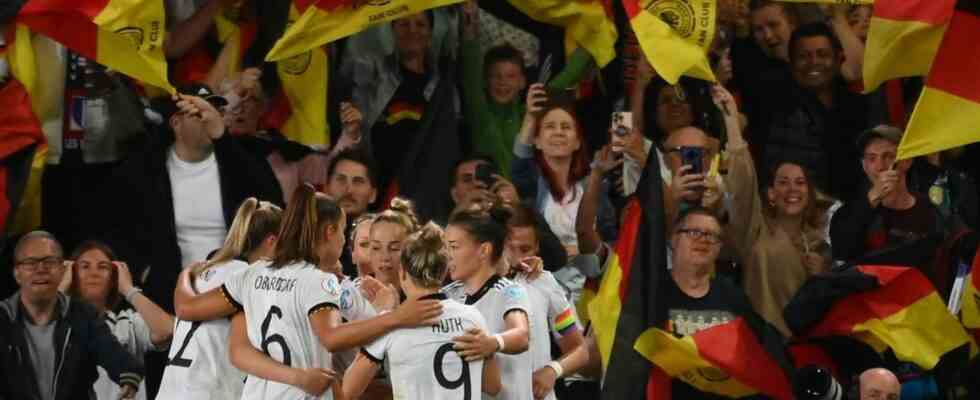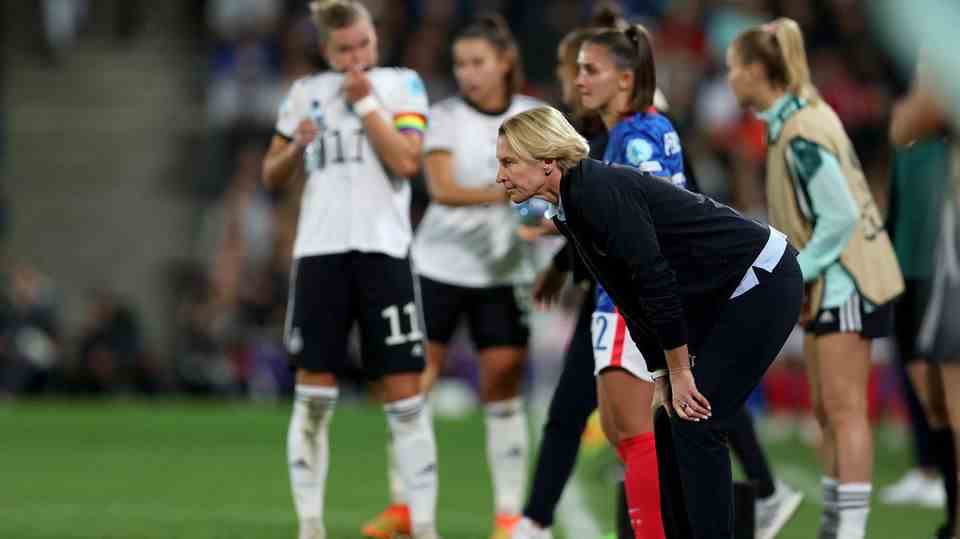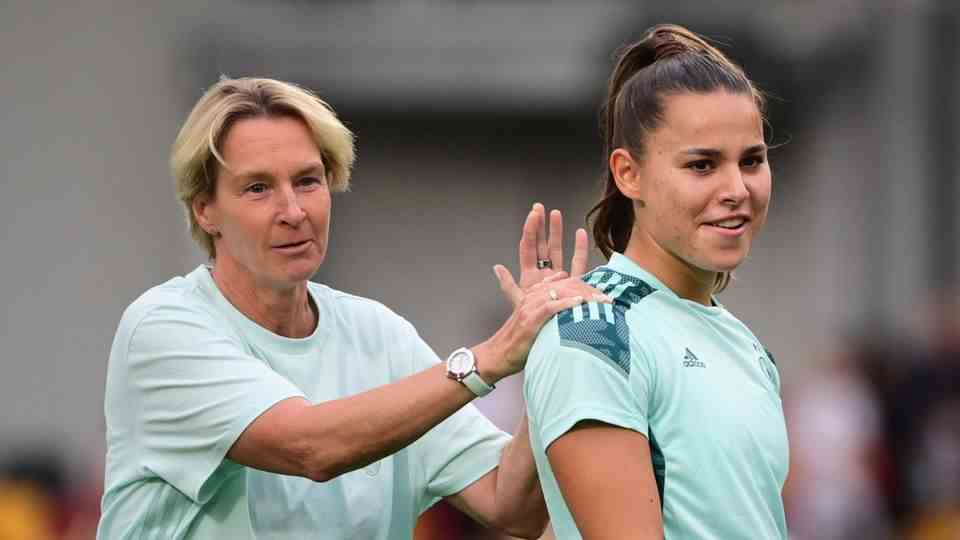opinion
Women’s European Championship 2022
You have to be eleven friends: How the DFB women play their way into our hearts
With attacking football and a lot of commitment, the German women’s national team inspires at the EM 2022 in England.
© Franck Fife / AFP
Honest, authentic, personable – the German women’s national team will conquer the hearts of the fans at the 2022 European Football Championship. This is not only due to success, but also to qualities that men seem to have lost.
Do you remember the youth book “You have to be eleven friends” by sports reporter Sammy Drechsel? The book is about Heini Kamke and his class at a Berlin elementary school, which was fighting for the municipal school championship in the 1930s. Above all, it’s about a sense of community and sportsmanship within the class, but also with other opponents. The title is based on the saying on the base of the Victoria statue, the predecessor of the championship trophy: “I have to be eleven friends if you want to win”. The lesson from this is simple: you can only be really successful if you act as a team. The youth book was published in 1955, the year in which the DFB banned women’s football.
And that brings us to the actual topic: the women’s national team of the German Football Association and the refreshing realization of how beautiful and pleasant football can still be. It doesn’t matter whether it’s in the preliminary round, quarter-finals or semi-finals, the German team impresses on so many levels at the women’s European Football Championship: They fight, they run, they support each other and they come across as honest and likeable.
If you look at the development of men’s football over the past two decades, you will hardly feel any sympathy for the players and clubs. Trained players stand in front of the microphones and give 0815 answers, simply conduct the interview themselves or break off the conversation at the first hint of criticism. There are clubs that, out of sheer lust for money, have now moved so far away from their fans that they would rather fly across Europe for games than play the derby just a few kilometers away. There are associations that are so sterile with slogans like “The Team” that despite winning the World Cup just a few years ago, they hardly have any sympathy in their own country.
Football EM 2022: The DFB team is refreshingly authentic
So when an Alexandra Popp stands in front of the microphone after winning the semi-final and says sentences like “nobody expected us and now we’re in front of 90,000 spectators in the final – there’s nothing nicer” and “Now it doesn’t make any sense anymore, to lose” says into the microphone, as a football fan you can only feel sympathy for this team. And then there’s the team spirit: Whether it’s Popp, as captain and goalscorer, or Lena Oberdorf as the heart of the team in midfield – nobody wants to accept praise for themselves and always puts the team in the foreground. The fact that after the final whistle the players thought of Klara Bühl, who was suffering from Corona, in a very entertaining way, is another sign of this unity.
But it is also the style of play that is refreshing. The team seemed hesitant against France in the first few minutes, France repeatedly showed their technical superiority and wanted to create chances in one-on-one situations. But it didn’t go that far, because the French didn’t meet one opponent, but always several. Even after counterattacks, the entire German team rushed back to their own penalty area and supported each other in tricky situations. The unfortunate own goal shortly before the break, the first goal conceded in the course of the European Championship, could have broken the neck for the team, which had been functioning smoothly up to that point. But led by Alexandra Popp and Lena Oberdorf, the team found its way back on track: with a lot of will, commitment and some exciting moves.
But it is also the role of the underdog that makes hearts beat faster. Yes, eight of the eleven European Championship titles went to Germany, but in recent years other countries have caught up enormously, perhaps even overtaking the DFB team in terms of development. The last title was six years ago with the Olympic victory, the last European title (2013) and World Cup triumph (2007) even further. Perhaps they were resting on their laurels too much, but other countries saw the potential in women’s football. In Spain, up to 91,000 spectators attend the duels between Real Madrid and FC Barcelona, the British Women’s Super League (WSL) announced an initiative just last year with which the average number of spectators is to be increased to 6,000 spectators. That may not sound like much at first, but Eintracht Frankfurt had the highest average attendance in Germany in the pre-season with 1580 visitors per game, the lowest was a measly 274. A large television deal should also contribute to the success in Great Britain. BBC and Sky are investing 24 million pounds (around 28.6 million euros) in the league by 2024, with many of the games being shown live on TV.
The potential is there, now the DFB has to use it too
12.187 million people in Germany are watching the German women’s European Championship semifinals in front of their televisions – more than at any previous European Championship game. In addition, the number of members (now more than 1.1 million out of a total of 7.1 million) and the number of players are increasing at the DFB. The DFB registered 186,000 active players in the past season, more than since the 2017/2018 season. The potential and the interest in Germany for a more professional game operation – where women can also live on a salary – seems to be there, it just has to be implemented. The DFB will also have to play an important role in the future. International matches during the week at 3 or 5 p.m. cannot and must not be the solution to wanting to present women’s football in Germany appropriately. Likewise, to fob off the women with a small part of the bonus that the millionaire men would have gotten for an EM title. The keyword “equal pay” must apply to the national teams in particular – also to make the sport attractive and to set a signal for league operations. Equal pay for men and women should not be a question of national team prize money, but a matter of decency.
Sammy Drechsel can no longer follow the successes of women’s football in Germany. He died in 1986, three years before the German women won their first European Championship title (and the legendary DFB tea service as a prize). Perhaps today he would have been inspired for a new book by a unit of German women who inspired their country. “You have to be eleven friends” so to speak – they definitely deserve this title, even if it doesn’t work out with the ninth European Championship triumph.




